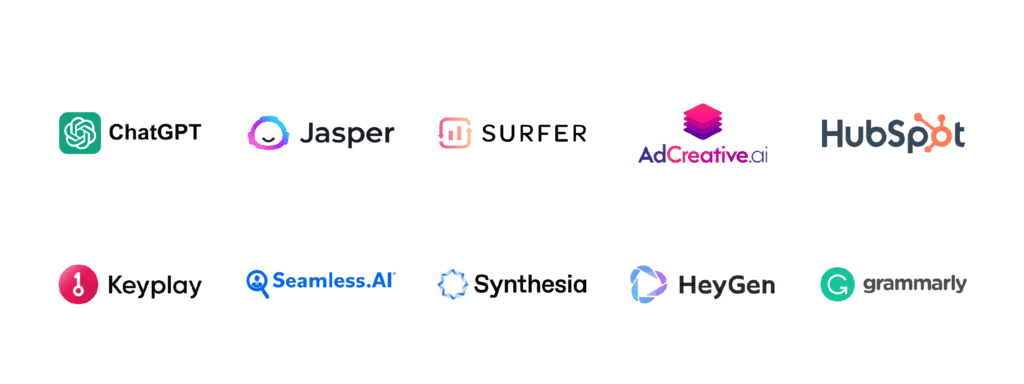Top industries benefiting from Growth Systems For B2B
Wiki Article
Revolutionize Your Business: Exactly How AI Automation Is Changing B2B Operations
AI automation is reshaping B2B operations in significant means. Firms are adopting this innovation to improve process and enhance efficiency. As jobs come to be automated, companies can concentrate on critical development rather than mundane procedures. The ramifications of these adjustments are extensive, influencing whatever from client communications to supply chain management. Comprehending this makeover is crucial, as the future of company rest on the effective integration of AI into daily operations. What lies ahead in this developing landscape?Comprehending AI Automation in B2B Context
As businesses progressively look for performance, recognizing AI automation within the B2B context comes to be vital. AI automation refers to the application of synthetic knowledge innovations to boost and improve business processes. In B2B settings, this can show up in numerous kinds, such as automating information access, maximizing supply chain logistics, or improving supply management. Organizations leveraging AI automation can lower functional expenses, reduce human error, and increase productivity. Additionally, AI tools can analyze vast amounts of data to give workable insights, allowing informed decision-making. Minarik AI. The assimilation of AI into B2B operations not just transforms conventional operations yet additionally fosters agility and scalability, enabling organizations to adjust to market changes swiftly and efficiently. Embracing this innovation is crucial for staying competitive in today's digital landscapeEnhancing Customer Experience Via AI
Just how can AI change consumer communications in the B2B market? AI boosts client experience by providing personalized, prompt, and reliable solution. Intelligent chatbots and virtual assistants can manage queries 24/7, making sure clients receive immediate responses. AI Automation For B2B. Predictive analytics make it possible for organizations to prepare for consumer requirements, tailoring offerings accordingly. AI-driven systems can assess client information, allowing for targeted marketing strategies and improved involvement. In addition, belief evaluation devices examine client feedback, helping organizations tweak their solutions. By automating regular tasks, AI frees up personnels to concentrate on high-value interactions, fostering stronger relationships. The combination of AI not only streamlines interaction however likewise develops trust and loyalty, eventually boosting the overall consumer experience in the affordable B2B landscape
Simplifying Supply Chain Monitoring With AI
AI plays an important role in maximizing supply chain management through anticipating analytics and automated inventory control. By leveraging predictive analytics, businesses can expect demand fluctuations and change their operations appropriately. Automated supply systems further enhance efficiency by ensuring supply levels are preserved, minimizing waste and enhancing total productivity.Anticipating Analytics Benefits
While many organizations deal with difficulties in managing intricate supply chains, anticipating analytics supplies a transformative solution by leveraging substantial amounts of information to forecast fads and maximize operations. By evaluating historic data together with real-time inputs, predictive analytics enables firms to recognize patterns and expect future demands. This foresight enables more informed decision-making, boosting effectiveness and lowering prices. In addition, services can proactively address possible interruptions by anticipating supply chain bottlenecks and adjusting techniques appropriately. The combination of anticipating analytics not just enhances inventory monitoring but additionally promotes more powerful connections with vendors and clients via prompt reactions to market shifts. Ultimately, the fostering of predictive analytics empowers organizations to stay affordable in a progressively dynamic business environment.Automated Supply Control
As services significantly rely upon anticipating analytics to enhance supply chain procedures, automated inventory control becomes an effective ally in this initiative. By leveraging AI-driven innovations, business can boost accuracy in stock monitoring, lower stockouts, and reduce excess supply. Automated systems examine real-time data, enabling businesses to forecast need fluctuations and adjust supply levels as necessary. This not only improves order fulfillment yet also improves money flow administration by minimizing holding expenses. Additionally, AI can identify patterns in acquiring behavior, enabling even more informed decision-making regarding provider partnerships and purchase approaches. Ultimately, automated stock control not just enhances operational performance yet also improves client fulfillment by guaranteeing product availability, solidifying its duty as a crucial component in contemporary supply chain monitoring.Data-Driven Decision Making Powered by AI
In today's competitive landscape, companies increasingly rely upon data-driven decision-making to boost functional efficiency and tactical planning. Man-made intelligence plays an essential function in this change by assessing vast quantities of data promptly and precisely. AI algorithms determine patterns, trends, and abnormalities that human analysts could overlook, allowing companies to make informed choices based upon real-time insights. This capacity allows companies to forecast market changes, enhance source appropriation, and customize their offerings to consumer demands. Additionally, AI-driven analytics help with risk evaluation and management, guaranteeing that organizations can browse uncertainties efficiently. By leveraging these advanced devices, services not just boost their decision-making processes yet additionally acquire an affordable benefit in their particular markets, promoting growth and innovation.Automating Repeated Jobs to Boost Performance

Incorporating AI With Existing Service Processes
Lots of websites companies encounter challenges when integrating AI with existing service procedures. These challenges commonly come from an absence of understanding relating to how AI can match present operations. Effective combination calls for an extensive evaluation of existing operations to identify locations where AI can include value. Organizations should also assure that their teams are geared up with the required abilities to take advantage of AI tools effectively. On top of that, smooth combination hinges on the compatibility of AI innovations with tradition systems. Companies frequently find it advantageous to embrace a phased method, piloting AI applications in particular departments prior to a wider rollout. This technique enables changes based upon initial responses, assuring smoother shifts and making best use of the potential benefits of AI automation in improving efficiency and effectiveness.Future Patterns in AI Automation for B2B Business
As B2B firms seek to the future, improved data analytics is readied to play a critical duty in driving decision-making processes. Intelligent procedure automation will additionally become a vital pattern, streamlining procedures and improving efficiency. These innovations guarantee to improve how organizations operate, eventually leading to more receptive and nimble companies.Enhanced Data Analytics
While organizations increasingly count on data-driven decisions, the function of AI in boosting data analytics is ending up being more necessary in B2B operations. AI innovations promote the collection and analysis of substantial datasets, enabling business to reveal valuable insights that drive calculated preparation. Anticipating analytics powered by AI allows companies to forecast market fads and client habits with better precision. Furthermore, machine knowing algorithms enhance data interpretation, recognizing patterns that human analysts may overlook. This results in more educated decision-making and enhanced resource appropriation - B2B Automation Consulting. As B2B business remain to embrace AI-driven analytics, they can expect improved functional efficiency, improved customer experiences, and an one-upmanship in the marketplace. The future of information analytics in B2B rests on integrating innovative AI abilitiesIntelligent Process Automation
Smart Refine Automation (IPA) is poised to change B2B procedures by seamlessly incorporating AI modern technologies with conventional business processes. This cutting-edge approach integrates robot process automation (RPA) with sophisticated AI capacities, enabling organizations to improve performance and precision. Companies can automate repeated jobs, such as data access and billing handling, allowing staff members to focus on critical campaigns. IPA also leverages maker learning and natural language handling, enhancing decision-making via real-time data evaluation. As businesses progressively embrace IPA, they can expect considerable expense reductions and improved client experiences. Future patterns indicate a growing reliance on IPA for scalability and adaptability, positioning companies to grow in an ever-evolving marketplace. Embracing IPA will be vital for preserving competitiveness in the digital age.Frequently Asked Concerns
What Industries Advantage A Lot Of From AI Automation in B2B Workflow?
Production, logistics, financing, and health care markets benefit most from AI automation in B2B procedures. These fields take advantage of automation to enhance efficiency, reduce costs, streamline processes, and boost decision-making with anticipating analytics and data-driven understandings.Just How Can Local Business Carry Out AI Automation Successfully?
Local business can implement AI automation effectively by recognizing recurring jobs, selecting appropriate devices, integrating services progressively, training staff, and continually assessing efficiency to optimize procedures, taking full advantage of and ensuring a smooth transition efficiency. Growth Systems For B2B.What Are the Prices Related To AI Automation Application?
The expenses related to AI automation application usually include software application procurement, infrastructure upgrades, training team, ongoing upkeep, and prospective examination charges. These expenditures can vary substantially based on the range and intricacy of the automation options chosen.Exactly how Do I Determine ROI From AI Automation Initiatives?
To determine ROI from AI automation campaigns, one must analyze cost savings, productivity improvements, and income development against implementation expenses. Tracking vital efficiency indicators in time offers beneficial understandings right into effectiveness and general roi.
What Abilities Are Required to Handle AI Automation Projects?
Reliable monitoring of AI automation jobs calls for abilities in job management, data analysis, programming, and understanding AI modern technologies. In addition, solid communication, analytic capacities, and flexibility are crucial for maneuvering the intricacies of such campaigns.As businesses increasingly seek efficiency, recognizing AI automation within the B2B context ends up being crucial. The combination of AI into B2B operations not only changes typical operations however likewise fosters dexterity and scalability, enabling companies to adapt to market adjustments swiftly and effectively. While organizations increasingly rely on data-driven choices, the duty of AI in boosting data analytics is becoming a lot more crucial in B2B procedures. Intelligent Refine Automation (IPA) is positioned to reinvent B2B operations by flawlessly incorporating AI innovations with traditional organization processes. Effective administration of AI automation tasks needs abilities in job monitoring, data evaluation, programming, and comprehending AI technologies.
Report this wiki page